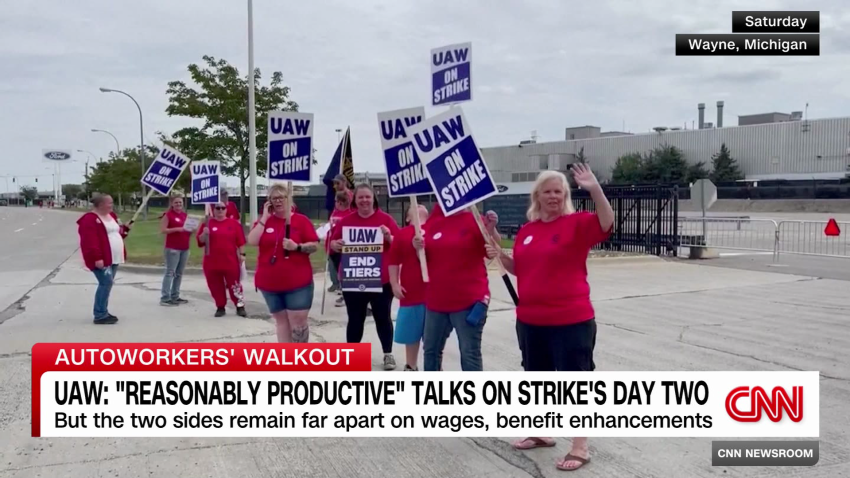The union representing Canadian autoworkers at Ford has put its strike plans there on hold, keeping its more than 5,000 members on the job at three plants there for at least another day, and providing some good news for an industry dealing with unprecedented labor disruptions.
Lana Payne, president of the Canadian union Unifor, which represents workers at Ford as well as General Motors and Stellantis, told CNN Tuesday morning that the union had been prepared to strike at its midnight deadline Monday night, but that a “substantive offer came from Ford at minutes before [the] deadline.”
The union granted the 24-hour extension of its contract with Ford to 11:59 pm Tuesday, and then continued negotiations throughout the night, Payne said.
The union had told its members to be prepared to strike at midnight, but just before that deadline the union told members that talks were continuing and that workers on overnight shifts should stay on the job for now.
Midnight drama
As time ticked past that midnight deadline, it was unclear if a strike would still start at any time, or if an unexpected 11th-hour deal would be reached. Finally, just after 1:30 am ET, word came of the formal one-day extension of the deal.
While the extension was short of a deal and a strike is still possible, the extension was a rare piece of good labor relations news for an auto industry that is reluctant to meet workers’ demands at the bargaining table, it suggested that even when a union and management appear far part, that gap can be closed.
“We will continue to work collaboratively with Unifor to create a blueprint for the automotive industry that supports a vibrant and sustainable future in Canada,” Ford said in a statement.
The drama came four days after the United Auto Workers union had started a strike against Ford, GM and Stellantis, the automaker that makes vehicles under the Jeep, Ram, Dodge and Chrysler names,
Payne told members earlier Monday evening that the two unions were working closely with one another and that she had spoken with UAW President Shawn Fain earlier in the day.
In that recording for members earlier in the evening Payne said the two sides were still far apart.
“We have made progress in important areas,” she said in the 7:30 pm ET recording, but added, “we are not where we need to be on key priority issues.” The union had said besides wages, its major bargaining goals revolved around benefits, particularly pension benefits, as well as job protections as the auto industry plans its transition from traditional gas-powered vehicles to electric vehicles.
Similar demands, different strategies
Ford is already grappling with a strike by more than 3,000 of its US employees that has shut down a major assembly plant in Wayne, Michigan, since Friday. The UAW decided to go on strike at all unionized US automakers, the first time in its history that it had struck the traditional “Big Three” at the same time. But it decided to strike only one assembly plant at each company, having 12,700 members walk out while most of the 145,000 members at the companies remained on the job.
By contrast, Unifor announced if it goes on strike, it will strike all the Ford facilities where it represents members. But its members will continue to work at the Canadian plants of GM and Stellantis. The union had granted them contract extensions while it focused its negotiations on reaching the best possible deal with Ford.
The issues Unifor is negotiating mirror many of the same issues at the center of the strike by the UAW - a demand for higher wages, improved benefits including pensions, and job protections for workers whose jobs could be affected by the industry’s plan to convert from traditional autos to electric vehicles in coming years.
“As some of you will know from experience, a lot can happen in final hours of deadline bargaining,” Payne said in her earlier remarks. “But we know where we stand here. We need Ford to deliver more to meet our members expectations.”
Unlike the UAW, Unifor has not spelled out details of its negotiating demands, or what Ford is offering. But Ford, GM and Stellantis are all on the record saying that they have offered UAW members about 20% in raises over the life of the contract, including an immediate 10% raise.
The UAW, which began negotiations demanding an immediate 20% raise and raises totaling 40% over the following few years, has said that offer is not sufficient considering the record or near-record profits the automakers are reporting, and how much ground its members have lost due to past contract concessions and inflation that has outstripped salary gains in recent years.
US factories could be affected
A Canadian strike could be a bigger blow to Ford’s sales than the UAW strike, which is so far is limited to one factory in Michigan in the case of Ford.
The two V-8 engines made in Windsor are the only source of those popular engines used in the the F-150 pickup truck, Ford’s best-selling vehicle, and the Mustang sports car, so production of the V-8 versions of those vehicles at US plants is likely to be halted by the Canadian strike.
The Michigan plant being struck produces the Ford Ranger pickup and the Ford Bronco SUV, which had US sales of 83,000 in the first half of this year. By comparison the V-8 version of the F-series pickup had US sales of 75,000. The V-8 version of the Mustang, which makes up about half of sales of that model, came to another 13,000 vehicles, while the Edge and Nautilus that are only built at the plant in Canada had sales of nearly 60,000.
Ford traditionally had the best relations with its unions of any US automaker. It has not had a strike in its Canadian operations since 1990 and has not had a US strike since 1978.





